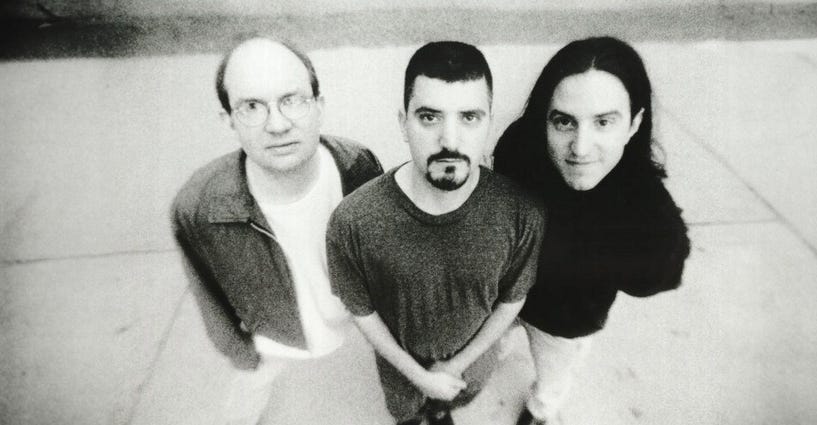Arcwelder | History of the Band
With raw energy and democratic songwriting, this trio brought the Midwest’s heart to 90s noise rock
Formed in Minneapolis in 1987, Arcwelder began their journey as Tilt-a-Whirl, named after the iconic carnival ride. However, legal pressure from the ride’s manufacturer prompted a name change to Arcwelder, inspired by an instrumental track on their debut album. The band comprised Scott Macdonald (drums, vocals), Bill Graber (guitar, vocals), and Rob Graber (bass, vocals), a lineup that remained consistent throughout their career.
Arcwelder’s stability and democratic songwriting process set them apart. Each member contributed vocals and songwriting, resulting in a unique interplay of styles and perspectives. Grounded by their industrial Midwest roots, the trio was influenced by bands like Hüsker Dü and Mission of Burma, yet they carved out a distinctive niche in the burgeoning indie rock scene.
Musical Style and Evolution
From the outset, Arcwelder balanced punk urgency with post-punk intricacy, fusing jagged guitar riffs, propulsive rhythms, and introspective lyrics. Critics often compared their sound to that of Hüsker Dü, though Arcwelder distinguished themselves with a more collaborative vocal approach and a focus on rhythmic precision.
James suggested this artist for a future Dig Me Out podcast episode. Each month, our Patronsare presented with a selection of albums suggested by listeners and asked to vote for their favorite.
The band’s DIY ethos remained intact throughout their career as they balanced day jobs with their musical pursuits. This authenticity infused their music with an unpolished yet deeply emotional core. Over the course of the 1990s, their sound evolved subtly, exploring more layered songwriting and intricate arrangements without sacrificing their raw energy.
Discography and Notable 90s Albums
Arcwelder’s 90s output on Touch and Go Records remains a testament to their enduring creativity and dedication to craft. Their albums captured the era’s underground rock spirit while maintaining a distinct identity.
• Jacket Made in Canada (1991): Their sophomore album, released on Big Money, Inc., includes “Favor,” which reached number 32 on John Peel’s “Festive Fifty” in 1992. This album set the stage for the band’s move to Touch and Go Records.
• Pull (1993): Their debut on Touch and Go, Pull is often regarded as their masterpiece. Tracks like “What Did You Call It That For?” and “Raleigh” showcase the band’s gift for combining melodic hooks with angular guitars. Magnet Magazine hailed the album as “a 45-minute masterpiece that still holds its own against almost anything from indie rock’s glory years.”
• Xerxes (1994): Following Pull, Xerxes showcased an even tighter, more refined sound, with layered instrumentation and a darker tone.
• Entropy (1996): This album is marked by some of the band’s most ambitious songwriting. Tracks like “Cranberry Sauce” and “All Mixed Together” highlight the band’s ability to blend emotional weight with dynamic shifts in tempo and tone. CMJ New Music Monthly praised its “propulsive, rhythmic, catchy rock.”
• Everest (1999): Closing out the decade, Everest reflects a maturation of Arcwelder’s sound, with introspective tracks like “Truth” and “Smile” displaying a more layered and melodic approach. Critics noted the polished production while celebrating the band’s continued focus on raw power and energy.
Throughout their career, Arcwelder’s music was often described as a puzzle of contrasts—angular yet melodic, raw yet cohesive. Their work with Touch and Go Records, a label synonymous with artistic integrity, further solidified their status as stalwarts of the underground rock scene.
Critical Reception
While Arcwelder never achieved mainstream success, their work garnered critical acclaim and a devoted following. AllMusic described Pull as “a perfect snapshot of what indie rock sounded like in the early 90s.” CMJ lauded their ability to deliver “complex yet accessible” music, while Magnet Magazine celebrated their knack for combining relentless energy with emotional depth.
Their live performances also stood out, earning praise for their unassuming yet tight musicianship. They were invited to perform at the UK’s All Tomorrow’s Parties festivals in 2002 and 2012, curated by Shellac, whose members were vocal admirers of Arcwelder’s music. Additionally, the names of all three members appeared on the cover of Shellac’s 1997 album The Futurist as a nod to their influence.
Influence and Legacy
Arcwelder’s enduring legacy lies in their role as one of the most consistent and authentic bands in the 90s noise rock scene. They influenced countless indie acts, demonstrating that music could be both challenging and heartfelt. Their emphasis on collaboration and their egalitarian creative process inspired a generation of musicians to approach their craft with humility and integrity.
Bands like Jawbox and Chavez have cited Arcwelder as an influence, praising their ability to fuse abrasive textures with melodic undertones. Their connection to the Minneapolis music scene was solidified when they were honored with a star on the First Avenue mural, a prestigious recognition of their contribution to the local music scene.
In 2023, Arcwelder returned with new music, releasing two tracks, “Lafayette” and “Take It Slow.” This culminated in the release of their album Continue in early 2024, produced by Jason Orris and mixed by Jawbox’s J. Robbins. The album reaffirmed their relevance, proving that their creativity and passion remain as vibrant as ever.
Arcwelder’s journey through the 1990s encapsulates the spirit of an era defined by artistic exploration and resistance to mainstream pressures. Their discography remains a vital chapter in the story of 90s music, a reminder that the most profound musical experiences often come from the margins. For fans of noise rock and indie, Arcwelder is a puzzle piece worth rediscovering—an emblem of what makes the underground rock scene so enduringly compelling.






My love of Arcwelder runs deep. They’re playing Chicago in early February and I am beyond stoked.